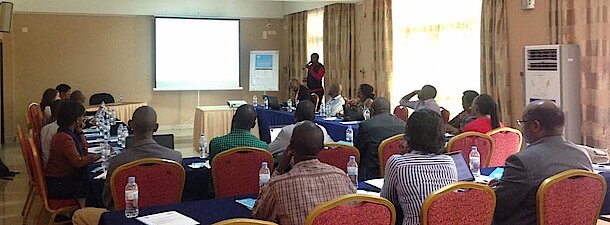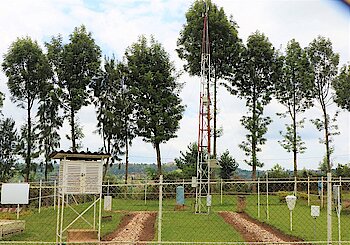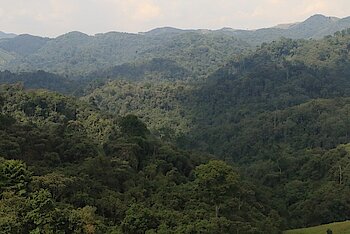
Rwanda NDCs Detailed Implementation Plan disseminated
Nowadays, climate change has become significant and emerging global challenge that the World is facing. Addressing the risks of climate change requires significant efforts by both the developed and the developing world. Unlike in the past years when Non Annex-I Parties (developing countries) to the United Nations Framework Convention on Climate Change (UNFCCC) had no obligations or commitments to reduce GHG emissions ; from Durban platform, developing countries were urged to join the global efforts to reduce GHG emissions.
The decision of the 19th session of the Conference of the Parties (COP 19) the UNFCCC held in Warsaw, Poland in 2013 invited all Parties to prepare and submit their Intended Nationally Determined Contributions (INDCs) to the UNFCCC secretariat before COP 21 held in Paris, France in December 2015.
With ratification of Paris Agreement (PA), the Intended Nationally Determined Contributions (INDCs) are no longer “Intended”, they have become Nationally Determined Contributions (NDCs) as Countries were recalled to look forward to the implementation of climate actions put forward in their NDCs.
In this line of joining global effort to combat climate change, following the ratification of Paris Agreement on 06th October 2016, Rwanda has developed a detailed implementation of Rwanda NDCs to translate committed adaptation and mitigation contributions into implementable measures. The detailed implementation plan of Rwanda NDCs was developed from May to June 2017 through a sector based consultative process. It maps stakeholders that are relevant to varying degrees for implementation.
The key sectors involved in NDCs implementation include Energy, Agriculture, Transport, Industry, Waste, and Forestry, Water use, Land use and Tourism.
Where possible the implementation estimates the costs and sustainable development co-benefits of the actions as well as Measurement, Reporting and Verification (MRV) of results and suggests timelines for their implementation. The plan also outlines capacity needs that must be addressed as well as barriers and risks that the different actions are facing in their implementation and provide recommendations and suggests next steps for a successful implementation
On 26th October 2017, at Lemigo Hotel in Kigali, Rwanda Environment Management Authority (REMA) has organized a dissemination workshop of the report on the detailed implementation plan NDCs to allow its smooth implementation.
To open the workshop, Mrs Coletha U. Ruhamya, Director General of REMA invited all sectors to refer to this implantation plan when implementing the actions related to their specific sectors. This implementation plan will help sectors to monitor how they are achieving the adaptation and mitigation contributions committed in Rwanda NDCs.
Topics
More posts
How Rwanda is using climate change data and projections to plan for the future
In 2011, Rwanda adopted a Green Growth and Climate Resilience Strategy to become a developed, climate-resilient, and low-carbon economy by 2050. To…
Rwanda celebrates World Ozone Day
Kigali, 16 September, 2021 - Today, Rwanda joins the rest of the world to mark the International Day for the preservation of the Ozone Layer. World…
Retrofit Electric Motorcycles Project; Another step towards emission reduction
The Greenhouse gases emission inventory report of 2015 indicated that the vehicles (that burns the fossil fuel) emit emissions at 13% of the total…
What you should know about Climate Adaptation Summit 2021 that is taking place online
Even though, the climate change is increasingly distressing, fortunately, there are many actions we can do to ensure our future is as prosperous as…
Beneficiaries of REMA’s Green Amayaga Project receive improved cookstoves to promote energy efficiency
Rwanda Environment Management Authority through the Forest Landscape Restoration in the Amayaga Region (Green Amayaga) Project is distributing…
Develop business and deliver green growth solutions
The economic development is a concern for every country around the World and everyone is concerned with personnel development. However, it is no…
From ambition to action: Rwanda’s climate resilience plan
On Saturday, December 12, 2020, global leaders are meeting to discuss a problem on many of our minds: climate change. The extraordinary virtual…
Green New Deal: Lesson Learned from the Republic of Korea, Rwanda and the European Union
This webinar was co-organized by the Korea Ministry of Foreign Affairs and the UNDP Seoul Policy Centre (USPC). It is the second event on the theme of…
REMA get the Electric Vehicle to support Rwanda's environmental protection efforts
The Rwanda Environment Management Authority (REMA) has taken delivery of its first ever electric vehicle that will be used to support the…








